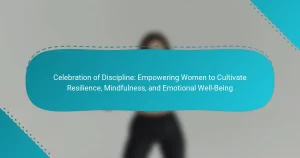Empowering women’s mental wellness is crucial for fostering resilience and emotional regulation. This article explores strategies like cognitive restructuring, mindfulness practices, and community support. It highlights the importance of challenging negative thoughts and cultivating a growth mindset. Additionally, actionable practices for immediate improvement in mental wellness are provided.
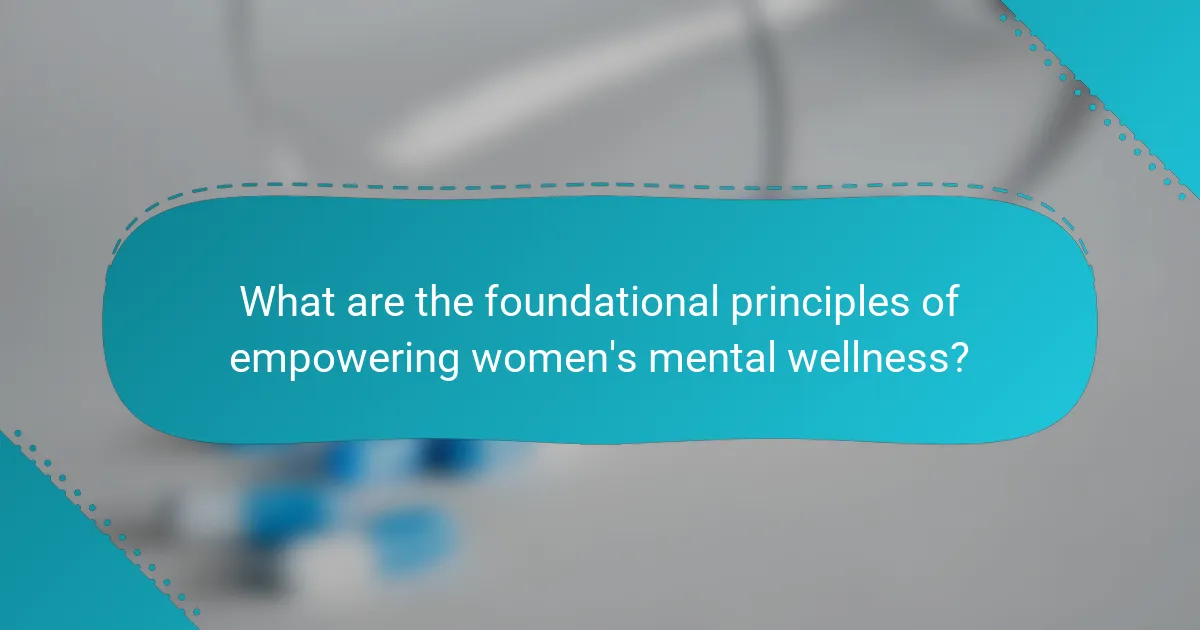
What are the foundational principles of empowering women’s mental wellness?
Empowering women’s mental wellness is rooted in fostering positive thought patterns and self-awareness. Key principles include practicing self-compassion, engaging in supportive communities, and prioritizing mental health as a vital aspect of overall well-being. These strategies enhance resilience, promote emotional regulation, and cultivate a growth mindset. Research shows that women who actively challenge negative thoughts experience improved mental health outcomes. Additionally, incorporating mindfulness practices can significantly reduce stress and anxiety, further supporting mental wellness.
How do thoughts influence emotional well-being?
Thoughts significantly influence emotional well-being by shaping perceptions and responses to experiences. Positive thinking can enhance resilience, reduce anxiety, and improve overall mental health. Cognitive Behavioral Therapy (CBT) supports this, emphasizing the connection between thoughts and emotions. Studies show that individuals who practice positive affirmations report higher levels of happiness and lower stress. By actively changing negative thought patterns, women can empower their mental wellness and foster a more positive outlook on life.
What role does self-awareness play in mental health?
Self-awareness significantly enhances mental health by fostering emotional regulation and resilience. It enables individuals to recognize their thoughts and feelings, leading to better coping strategies. Research indicates that self-aware individuals are more likely to engage in positive self-talk, which can reduce anxiety and depression. Additionally, self-awareness promotes personal growth and the ability to navigate life challenges effectively. By understanding their emotions, women can empower themselves to make healthier choices, ultimately improving their overall mental wellness.

What are the universal strategies for changing negative thought patterns?
To change negative thought patterns, adopt strategies like cognitive restructuring, mindfulness, and positive affirmations. These methods empower women to enhance mental wellness by fostering a healthier mindset.
Cognitive restructuring involves identifying and challenging negative thoughts to replace them with more balanced perspectives. Mindfulness practices help in recognizing negative thought patterns without judgment, allowing for greater emotional regulation. Positive affirmations reinforce self-worth and encourage a more optimistic outlook.
Research indicates that these strategies can significantly reduce anxiety and depression, enhancing overall mental health. By consistently applying these techniques, women can create lasting change in their thought processes and improve their quality of life.
How can cognitive behavioral techniques improve mindset?
Cognitive behavioral techniques can significantly enhance mindset by reshaping negative thought patterns. These strategies promote positive thinking, emotional regulation, and resilience. For instance, cognitive restructuring helps identify and challenge distorted beliefs, fostering a more optimistic outlook. Regular practice can lead to lasting changes in behavior and attitudes, ultimately empowering women’s mental wellness.
What steps are involved in cognitive restructuring?
Cognitive restructuring involves several key steps to effectively change negative thought patterns. First, identify negative thoughts and beliefs. Next, challenge these thoughts by examining evidence for and against them. Then, replace negative thoughts with more balanced, positive alternatives. Finally, practice these new thought patterns consistently to reinforce mental wellness.
How do positive affirmations impact self-esteem?
Positive affirmations significantly boost self-esteem by reshaping negative thought patterns. They encourage self-acceptance and foster a positive self-image. Research shows that consistent use of positive affirmations can lead to improved mental health outcomes, including reduced anxiety and increased resilience. A study indicated that individuals practicing daily affirmations reported a 20% increase in self-esteem over eight weeks. By reinforcing positive beliefs, affirmations empower women to embrace their worth and capabilities.

What unique approaches can enhance women’s mental wellness?
Empowering strategies for women’s mental wellness include cognitive reframing, mindfulness practices, and community support. Cognitive reframing helps women shift negative thought patterns, fostering resilience. Mindfulness practices, such as meditation, enhance emotional regulation and reduce stress. Community support provides a sense of belonging, which is crucial for mental health. Together, these approaches create a holistic framework for enhancing women’s mental wellness.
How can community support systems foster resilience?
Community support systems can significantly enhance resilience by providing emotional, informational, and practical assistance. These systems foster connections among women, creating a network that shares experiences and coping strategies. For instance, peer support groups enable members to discuss mental wellness openly, reducing feelings of isolation.
Additionally, community programs that focus on mental health education empower women with knowledge about coping mechanisms and resources. This unique attribute of community support is crucial as it cultivates a sense of belonging and shared purpose.
Research shows that individuals involved in supportive communities report higher levels of resilience and lower stress. As a result, these systems not only aid in immediate emotional support but also contribute to long-term mental wellness strategies.
What is the significance of women’s specific mental health needs?
Women’s specific mental health needs are significant because they address unique challenges and experiences. Factors such as hormonal changes, societal pressures, and trauma can impact women’s mental wellness differently than men’s. Research indicates that women are more likely to experience anxiety and depression, highlighting the need for tailored strategies. Empowering approaches, like cognitive restructuring, can effectively address these issues, fostering resilience and enhancing overall mental health.
How can tailored therapy options address these needs?
Tailored therapy options can effectively address women’s mental wellness needs by providing personalized strategies. These options consider individual experiences, preferences, and specific challenges. For example, cognitive-behavioral therapy (CBT) can help reshape negative thought patterns, while mindfulness practices promote emotional regulation. Integrating these approaches enhances resilience and fosters a supportive environment for growth. Evidence suggests that personalized therapy increases engagement and improves outcomes for women facing mental health challenges.
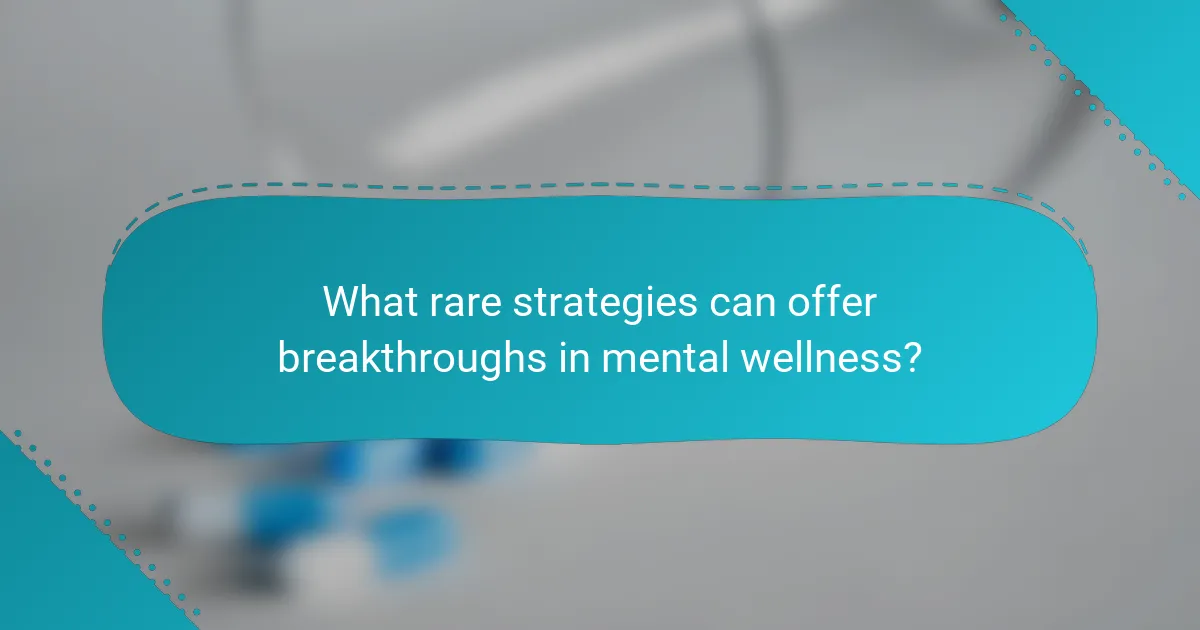
What rare strategies can offer breakthroughs in mental wellness?
Innovative strategies such as mindfulness, cognitive restructuring, and nature immersion can significantly enhance women’s mental wellness. These approaches focus on altering thought patterns, fostering resilience, and connecting with the environment. Mindfulness practices encourage present-moment awareness, reducing anxiety and improving emotional regulation. Cognitive restructuring helps identify and challenge negative thoughts, leading to more positive mental frameworks. Nature immersion, or spending time in natural settings, has been shown to lower stress levels and boost mood. Implementing these rare strategies can lead to transformative breakthroughs in mental wellness.
How can art and creativity serve as therapeutic tools?
Art and creativity can significantly enhance mental wellness by providing emotional expression and reducing stress. Engaging in artistic activities fosters self-discovery and boosts self-esteem. Creative outlets, such as painting or writing, serve as unique therapeutic tools, allowing individuals to process emotions and experiences. Studies indicate that art therapy can lead to decreased anxiety and improved mood, making it a valuable strategy for women’s mental wellness.
What innovative practices are emerging in women’s mental health?
Innovative practices in women’s mental health focus on holistic approaches and community-based strategies. Techniques like mindfulness, cognitive-behavioral therapy, and peer support groups empower women to manage their mental wellness effectively. Research shows that these practices improve emotional resilience and overall well-being. Additionally, integrating technology, such as mental health apps, provides accessible resources tailored for women’s unique needs.
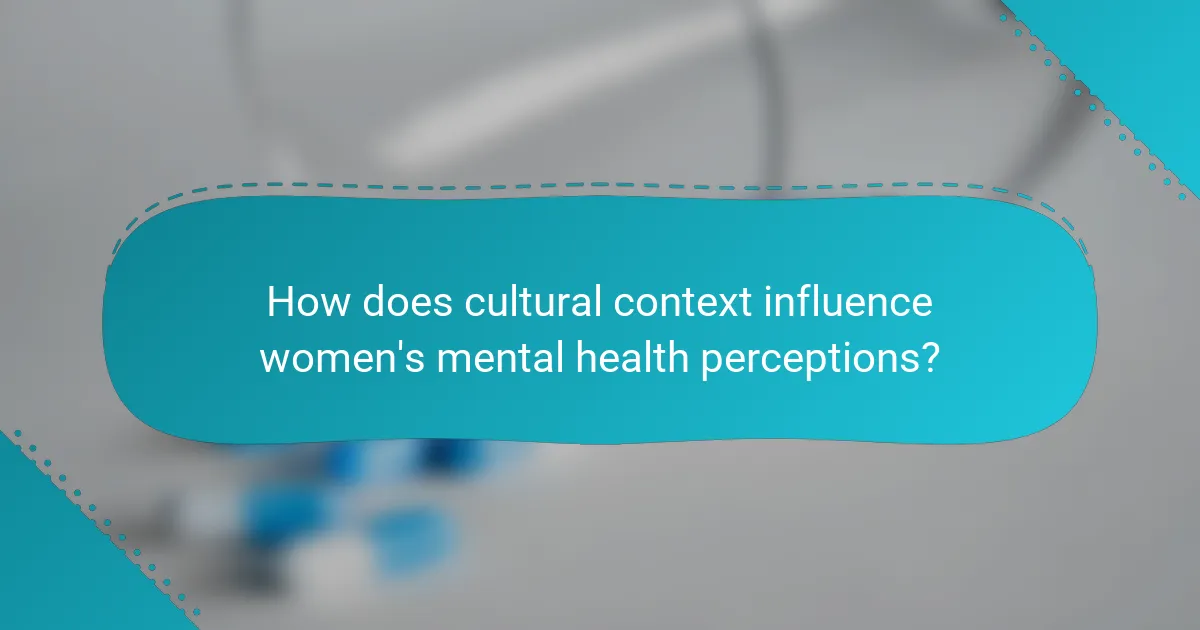
How does cultural context influence women’s mental health perceptions?
Cultural context significantly shapes women’s mental health perceptions through societal norms and values. Different cultures define mental wellness uniquely, impacting how women view their mental health needs and seek help. For example, collectivist cultures may prioritize family and community over individual mental health, leading to stigma around seeking therapy. Additionally, cultural beliefs can influence stressors, coping mechanisms, and access to resources, which are vital for mental wellness. Understanding these influences is crucial for developing effective empowerment strategies tailored to women’s diverse experiences.
What common misconceptions about mental health exist in society?
Common misconceptions about mental health include the belief that it only affects certain people, that mental illness is a sign of weakness, and that therapy is only for severe cases. Many think mental health issues are not real or can be simply overcome with willpower. Additionally, there’s a misconception that medication is the only solution, ignoring the effectiveness of lifestyle changes. These misunderstandings can prevent individuals from seeking help and support, impacting overall mental wellness.
How can cultural narratives shape women’s experiences?
Cultural narratives significantly influence women’s experiences by shaping perceptions, expectations, and behaviors. These narratives define social norms that affect mental wellness and self-identity. For instance, positive representations of women in media can empower individuals, fostering resilience and self-efficacy. Conversely, negative stereotypes can lead to diminished self-worth and mental health challenges. Acknowledging and challenging these narratives can promote healthier mental frameworks, enabling women to reclaim their narratives and enhance their well-being.
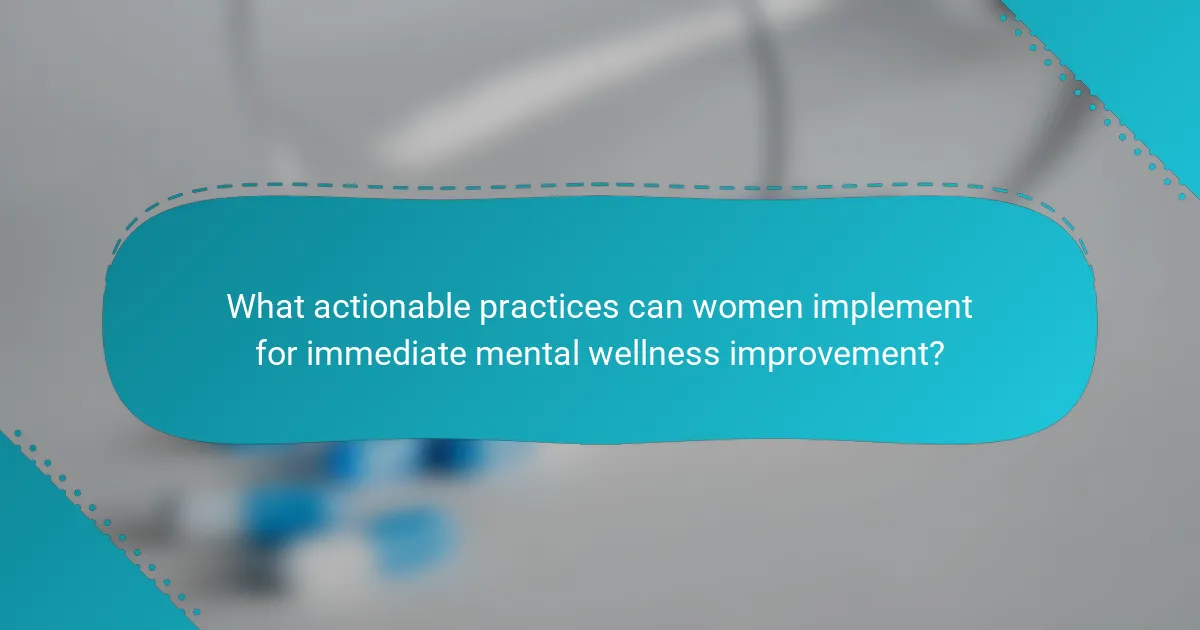
What actionable practices can women implement for immediate mental wellness improvement?
To improve mental wellness immediately, women can adopt several actionable practices. These strategies focus on changing thought patterns and enhancing emotional resilience.
1. Practice mindfulness meditation daily to reduce stress and increase awareness.
2. Engage in regular physical activity, which boosts mood and cognitive function.
3. Maintain a gratitude journal to shift focus from negativity to appreciation.
4. Set realistic goals and break them into manageable tasks to build confidence.
5. Foster social connections by reaching out to friends or joining support groups.
6. Limit exposure to negative media and curate a positive environment.
Implementing these practices can lead to significant improvements in mental wellness.
What daily habits can support a positive mindset?
To support a positive mindset, establish daily habits that promote mental wellness. Start each day with gratitude journaling to enhance positivity. Incorporate mindfulness practices, such as meditation, to reduce stress. Engage in regular physical activity, which boosts mood and energy levels. Connect with supportive friends or family to foster emotional resilience. Prioritize adequate sleep to improve cognitive function and emotional regulation. Lastly, set achievable goals to create a sense of purpose and accomplishment.
What common mistakes should be avoided in mental wellness journeys?
Avoiding common mistakes in mental wellness journeys is crucial for effective progress. Key mistakes include neglecting self-care, setting unrealistic goals, resisting change, and failing to seek support. Recognizing these pitfalls can empower women to create a more positive mental wellness experience. Emphasizing gradual change fosters sustainable growth, while accountability enhances motivation.
What expert insights can guide sustainable mental health practices?
Expert insights emphasize cognitive restructuring, mindfulness practices, and community support as key strategies for sustainable mental health in women. Cognitive restructuring helps women identify and alter negative thought patterns, fostering resilience. Mindfulness practices, such as meditation and deep breathing, promote emotional regulation and reduce anxiety. Community support networks provide essential social connections, enhancing overall mental wellness. Implementing these strategies can lead to lasting improvements in mental health outcomes.


